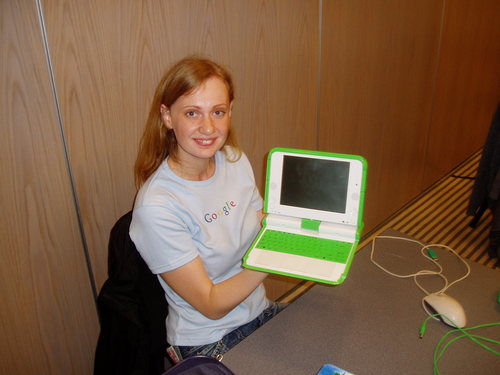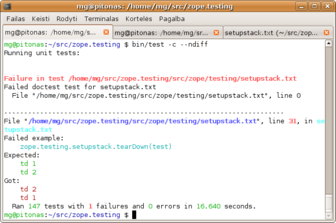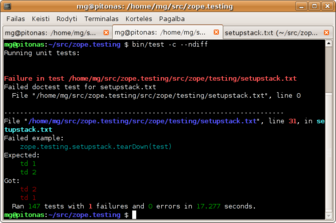A week and a half ago I bought a new laptop: a Lenovo T61 (the 15"
widescreen version). It's big and not very pretty (but the large screen is
very nice), and was a big pain to install. After several days of fiddling I've
got Ubuntu Gutsy running on it quite well, with nearly all hardware working.
Installation: I used Gutsy Tribe 3 Alternate CD (because
the desktop CD either wouldn't boot, or would give me a blank screen). I had
to finish the installation by touch (by pressing Enter whenever the CD spun
down), because in the middle of installing packages, after installing
xresprobe, the screen went blank and never came back. I think I could've
used the regular CD if I thought to set SATA to Compatibility in the BIOS
earlier.
Video (Intel 965GM, 1280x800): worked out of the box (with
the 'intel' driver) with all xrandr 1.2 and 3D Compiz goodness. One minor bug,
already fixed upstream: GDM and gnome panels were limited to upper-left
1024x768 area because X thought it had a TV connected. I added xrandr
--output TV --off into /etc/gdm/Init/Default as a workaround. There
are some minor problems (text consoles sometimes work and sometimes show a
blank screen; xv doesn't work with XAA; enabling EXA in xorg.conf makes the
server segfault; you have to specify a virtual desktop size in xorg.conf if you
want to use xrandr to get dual-head modes; compiz on a dual-head screen
1280x800+1280x1024 mode doesn't work well).
Sound (Intel HDA): didn't work out of the box. I was unable
to build ALSA from CVS (some error with kernel headers). In the end I used
alsa-source from Ubuntu, with three extra patches. Sound now works, but is
pretty quiet even at maximum volume, especially when watching movies.
Wireless (Intel 3945ABG): worked out of the box, after I
realized I had to enable one cryptically named BIOS setting ("Internal Wireless
Radio Frequency"). NetworkManager doesn't work. Sometimes the userspace
daemon (/sbin/ipw3945d-kernelversion) dies and I have to restart it
manually. This, by the way, is the only non-free driver I have; I haven't
tried iwlwifi yet.
Suspend to RAM: worked after I upgraded my kernel to
Gutsy's 2.6.22-9.26 (which is not released yet, I built a snapshot from git)
and added acpi_sleep=s3_bios to the kernel command line. I've heard
that a newer version of the X 'intel' driver will make the acpi_sleep setting
unnecessary.
Fingerprint reader: worked once I installed thinkfinger
from sources (it's not packaged for Ubuntu yet). It works in GDM and in
terminals only; gksu breaks it (and then you have to open a terminal and
killall gksu, or you won't be able to use fingerprints any more in this
session), and gnome-screensaver doesn't even try to use it.
Bluetooth: works, after I added thinkpad-acpi into
/etc/modules (it wasn't loaded by default). The LED doesn't work well: it
stays off even if Bluetooth is enabled. Strangely, if I reboot with Bluetooth
on, the LED shines until I log in, then turns off. I haven't figured it out
yet. By the way, install bluez-gnome if you want to be able to pair your
laptop to other Bluetooth devices. I'm surprised that it isn't installed
by default.
Screen brightness: the Fn-PgUp/Fn-PgDn keys don't work well
(they go into a weird feedback loop and ramp the brigtness all the way to the
maximum/minimum). I can adjust the brightness manually with xbacklight.
CD/DVD: works only if you go to the BIOS and set the
SATA setting to Compatibility instead of AHCI. I haven't tried burning
any CDs/DVDs, but wodim -prcap says it could.
4-in-1 card reader: doesn't work, apparently.
USB: 10-15 minutes after a reboot the kernel gets an
unhandled interrupt 21 (or sometimes 23) and disables it. Once that happens,
the two USB ports on the right partially stop functioning (you plug in devices
and nothing happens, but if you had a mouse plugged in before, it continues to
work).
High-pitched noise when on battery power happens when the
CPU enters low-power states. echo 2 >
/sys/module/processor/parameters/max_cstate gets rid of the annoying
noise at the expense of battery life (which, incidentally, appears to be about
2.5-3 hours with the standard 6-cell 53 Wh battery).
The rest: wired Ethernet works (out of the box), keyboard
works (naturally), trackpoint works, touchpad works, ThinkLight works, CardBus
works. I haven't tried the microphone, the modem, the ExpressCard slot, or
Firewire.
Overall I'm pretty happy with my T61. If you plan to buy
one, and don't want to spend a week patching kernels and compiling stuff from
source, I'd recommend waiting until October, when Ubuntu 7.10 will be released.
I expect all the bugs to get ironed out by then. Most of the problems have
been reported in Launchpad and/or upstream repositories, but I ran out of steam
before I checked all of them. The bugs I know about are listed on this del.icio.us page.


